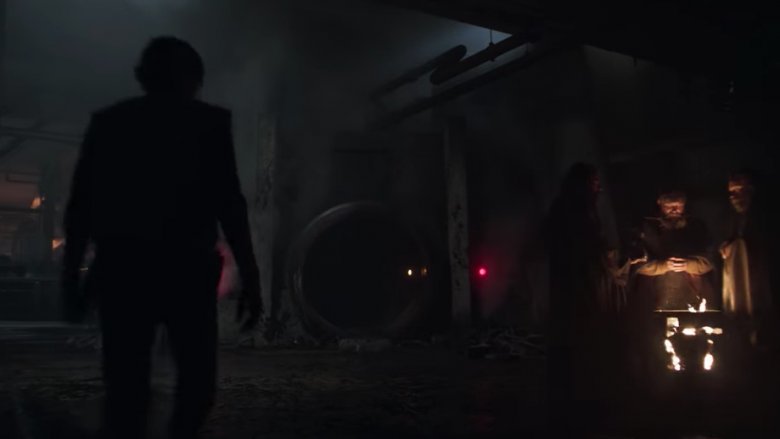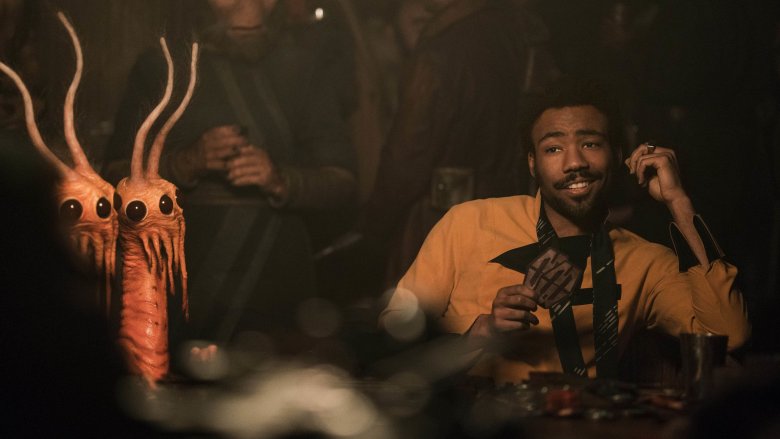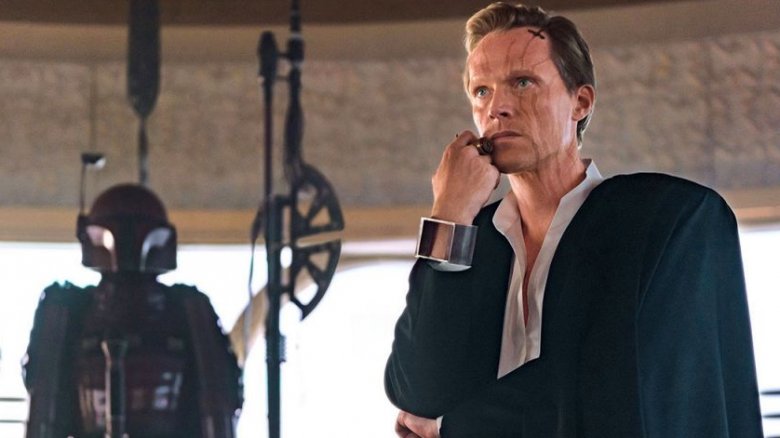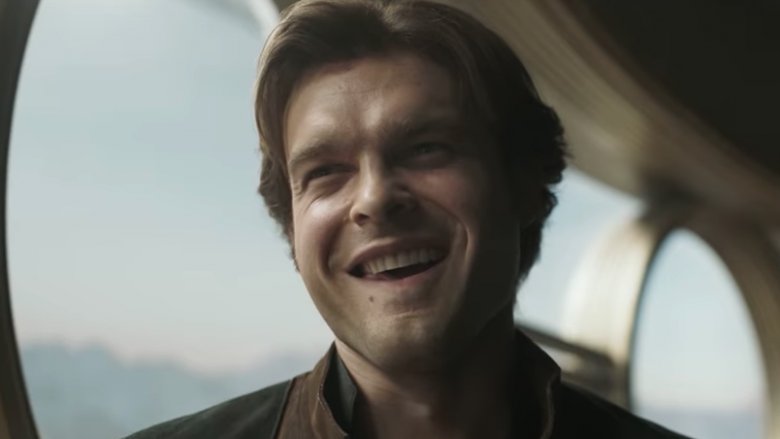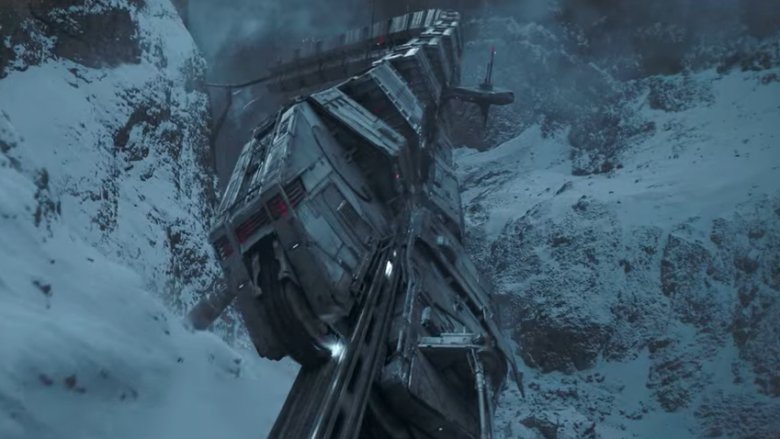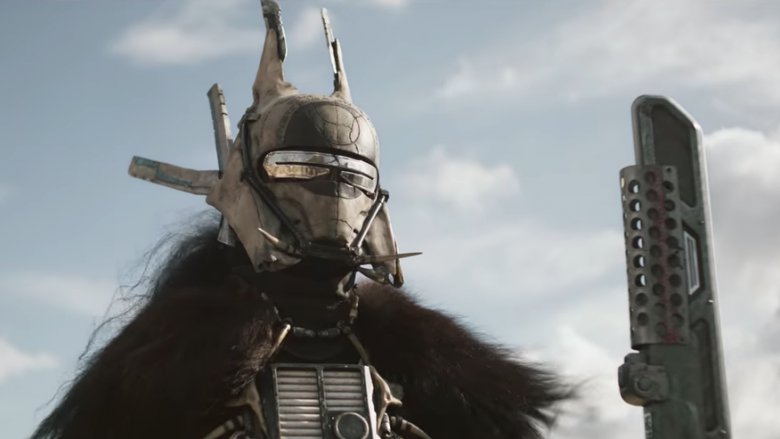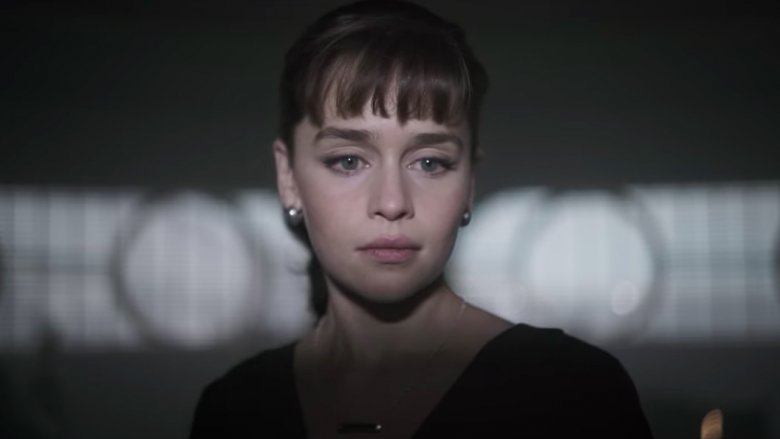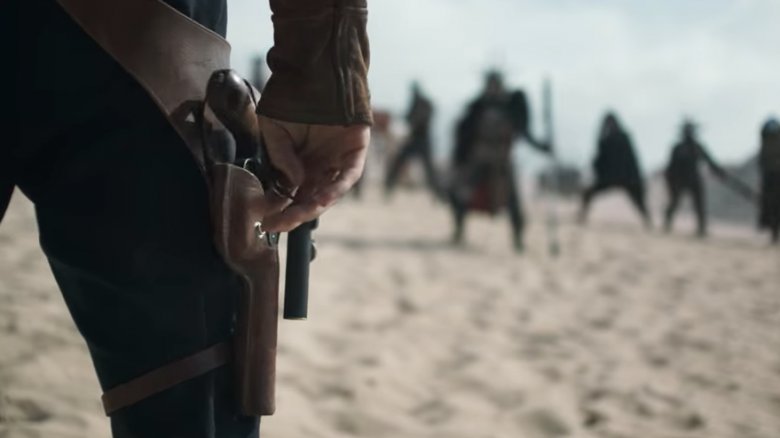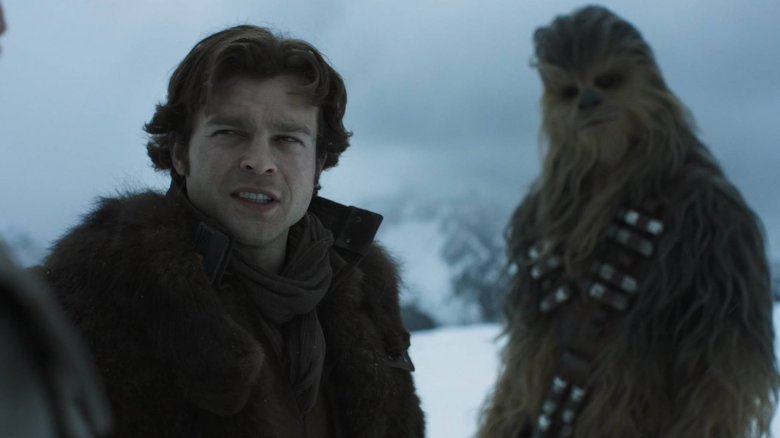5 Best And 5 Worst Things About Solo: A Star Wars Story
After an infamously troubled production and months of promotion and speculation, Solo: A Star Wars Story has finally arrived. Directed by Ron Howard, the film tells the story of the early days of Han Solo, played for the first time by Alden Ehrenreich instead of original actor Harrison Ford. It features some great action set pieces, killer special effects and creature design, and a handful of genuinely memorable performances. It's far from perfect. Still, there are far worse ways to spend a couple of hours at your local theater than a fun Star Wars movie, and if Solo isn't the most essential chapter in the blockbuster saga about a galaxy far, far away, it's actually better than a number of entries in the franchise. Buckle up for hyperspace — there are going to be plenty of spoilers ahead as we take a deep dive into the five best and five worst things about Solo: A Star Wars Story.
Best: Lando steals the show
Who didn't see this one coming? The excitement to see Donald Glover debut as legendary wheeler-dealer Lando Calrissian has been palpable. It felt like the only real choice, akin to Patrick Stewart as Professor X or Ian McKellan as Gandalf. Still, there are no sure things in movies, least of all in Star Wars (just look at the prequel trilogy). Fortunately, nobody need worry. Glover's performance delivers.
Everything a young Lando should be is present in Glover's performance. He's suave and talented, yes, but also constantly posturing and clearly insecure. Glover is at his best in Solo when acting out Lando's more narcissistic tendencies (his video autobiography recording segment is inspired stuff). He even nails the tone and inflection of Lando's speech, dropping his voice about half an octave and enunciating words the same way Billy Dee Williams does in The Empire Strikes Back without ever doing an outright impersonation. Throw in his (romantic?) chemistry with his droid copilot L3-37 and you've got a character who steals every scene he's in. Even when doubts about whether Solo would be worthwhile were running rampant, Glover as Lando seemed like the one thing everyone could agree would be worth the price of admission, and he lives up to the hype.
Worst: Lighten up - literally
Memorable imagery has been a staple of Star Wars from day one. From the binary sunset to the lightspeed kamikaze, Star Wars looks great. Heck, even the prequels are pretty stunning on a purely visual level. Solo has a couple of moments that are very well framed (Han's showdown with Enfys Nest comes to mind) but as a whole the movie is, at best, bit of a letdown visually. At worst, it's actively bad and interferes with one's enjoyment of the film.
This is particularly evident in the first act, which takes place mostly in seedy alleys and crime dens. These sequences are terribly lit to the point that it's nearly impossible to follow the action. Yes, they take place in dark rooms, so abundant light isn't the point. But there's a difference between dim lighting and bad lighting, and Solo's first act features a whole lot of the latter. It's not an issue present throughout the entirety of the film, but it doesn't get much better, either. There's a vague workmanlike competence to the cinematography, but it never wows or feels as though it has purpose. A story as comparatively small as Solo could have benefited hugely from some really stellar camerawork; unfortunately, its visuals leave us with very little to remember.
Best: Ante up
The Star Wars saga is filled with some of the most memorable action of all time. Lightsaber duels, interstellar battleship chases, and epic battle sequences are the franchise's bread and butter. It's interesting, given this, that the most memorable scene in Solo doesn't feature so much as a laser pistol. It's simply two over-inflated egos sitting across from each other at a table and egging one another on.
The moment Han and Lando meet for the first time immediately feels as momentous as it ought to. There's a palpable tension as the two size one another up, each offering up one-liners, boasts, and lies. It's psychological chess at its finest, and once the card game begins, it cranks it into lightspeed. The editing really works wonders here — the cuts quicken with the pace of the game and the ferocity of the two men trying to outsmart one another. When Lando finally lays down a full sabacc hand (which he only has because he cheated), it feels like the final crescendo of a magnificent symphony. Solo's train heist, droid rebellion, and the thrilling double-crosses in the finale can't compare to Lando and Han sitting down for a game of cards.
Worst: Dryden Vos disappoints
Even when the franchise is at its worst, Star Wars has a knack for great villains. From Vader to Maul, Snoke to Jabba, a Star Wars movie doesn't quite feel like it lives up to the entirety of its potential without one. We're not saying Solo doesn't feel complete, mind you, but its primary antagonist (crime boss Dryden Vos) definitely isn't going into the Hall of Fame any time soon.
Even without the knowledge that the character was originally going to be a half-animal, half-human creature performed by Michael K. Williams, you can't help but feel a little bored with Paul Bettany's take on the character. He's not turning in a bad performance or anything, it's just nothing we haven't seen in a hundred movies before. Vos is a sophisticated but seedy crime boss who keeps a raging, volatile temper simmering under his uncomfortably friendly exterior. It feels like such a hodgepodge of mob boss cliches that it never takes on a life of its own. Bettany is an immensely talented actor and seems to be doing the best he can with the material, but it's hard to not wonder what could have been. At the very least, a half-mountain lion mob boss would have been pretty hard to forget.
Best: Alden Ehrenreich sticks the landing
It many respects it's the gig of a lifetime, but Alden Ehrenreich also found himself in an unenviable position when he was first cast as Han Solo. It's not hyperbolic at all to say that Han is one of the single most beloved movie characters of all time — thanks in no small part to Harrison Ford's performance. Ford is inseparable from Han, and any actor stepping into the role has some big shoes to fill. Despite those massive expectations — and apparently needing an acting coach on the set — Ehrenreich does the seemingly impossible in Solo: he makes you forget he's not Harrison Ford.
Ehrenreich never seems to be doing a Ford impression, which would have been an understandable approach to the role. Instead he makes it his own. In his hands Han feels like an organic extension of Ford's take on the character as well as fresh and unexpected. Ehrenreich also manages to balance character tics so well that they don't become pure imitation. Han's accent and vocal tone feel indebted enough to Ford's original performance so that the two versions feel like the same character, but past that, Ehrenreich takes the ball and runs with it. His Han is still witty and caustic, but in a way that feels like youthful bravado rather than scorn. He also gives Han a naive ambition and unwitting optimism that plays out beautifully. The greatest compliment we can pay Ehrenreich's performance? We're excited to see more.
Worst: The first act struggles
Solo's troubled production is common knowledge at this point. Between reshoots, acting coaches, and directors getting fired, one could be forgiven for going into the film with low expectations. That being said, one of the most impressive things about Solo as a whole is how invisible those seams are. Ron Howard really does salvage the majority of this movie — emphasis on majority.
The first act of the film is the portion that seems to have been most affected by the film's tumultuous production. It's tonally all over the place. There's no flow to the action or to the story, the pseudo-opening scroll ends up being a redundant information dump, interesting characters are introduced and killed off before we have time to get attached. It feels like various tones and moments are struggling for dominance, which is to be expected from a movie with multiple directors. That's no excuse, though. Nothing about the first 20 minutes of the film really works, and it's largely because it doesn't seem to have any sense of where it stands. Once Han, Chewie, and Beckett board Vos' ship, Solo finds itself, but it takes longer than it should to get there.
Best: Worldbuilding
More interesting than any of its characters, action sequences, or insight into Han's origins is the way Solo expands the world of Star Wars. The universe is so ripe for new ideas and characters that an entry into this franchise isn't doing its job if it isn't exploring in some fresh way. Solo is, compared to other entries in the saga, a pretty small story, and as such, doesn't allow for the expansive worldbuilding of something like The Last Jedi. That said, what it does have in that department works beautifully.
Solo is at its most engaging when building the criminal underworld of Star Wars. Crimson Dawn, a syndicate of mob bosses who run the shadier corners of the galaxy, is an immediately intriguing concept ripe for further exploration. The idea that there's a network of crime families working with the Empire (and rival syndicates as well) sets up a bevy of ideas that we can't wait to see further explored. That the outfit is headed by Darth Maul, making his first cinematic appearance since The Phantom Menace, is even more fascinating. On top of that, Solo's introduction of Enfys Nest and her Cloud Riders, a gang of renegade refugees, is an inspired piece of new Star Wars lore. These bits of expansion come in small pieces, but as a whole form a very engaging look at corners of this galaxy we've never seen before.
Worst: Everything feels smaller
The ways Solo builds on Star Wars are great. But it also goes out of its way to make the saga feel smaller, largely through fan service and over-explaining details perhaps best left to the imagination. As an origin story, some of this is to be expected. It does, however, beg the question as to whether or not Star Wars is better for it.
The most prominent example is the Kessel Run. The set piece in which Han and the crew make the run, only narrowly avoiding death by giant Lovecraftian tentacle creature, is awesome. But finding out what the Kessel Run is to begin with still feels somewhat unnecessary. Our understanding of Star Wars and of Han as a character isn't altered or improved after seeing it play out. It simply explains away one of the more intriguing pieces of Star Wars lore in a way that's far less interesting than it could have been. Certain aspects of Han's origin are inevitable, like how he and Chewbacca come together. But did we really need to know how he came into possession of his signature blaster? Does it really make Han more intriguing a character to discover the origin of his last name? The abundance of explanation that nobody asked for in Solo serves little purpose — and ultimately shrinks some of the possibilities in its massive universe.
Best: The third act brings it all home
It's a sort of hybrid heist-western, so you'd expect Solo to have a solid plot twist or two. The film's third act is a series of double and triple-crosses that come at such breakneck speed that you may get whiplash trying to follow them. However, they're all somewhat expected. This is a movie about criminals, after all. That said, there's another major plot twist that moves the final act into motion, one that's legitimately surprising: Enfys Nest and her Cloud Riders aren't smugglers at all, but refugees forming the first seeds of what will become the Rebel Alliance.
There's always a war to be fought in these movies, always a battle between good and evil. Solo seems like the first installment in the franchise whose focus is elsewhere. It pulls back and looks at inhabitants in this world constantly ravaged by war who aren't actively involved in it. It's refreshing.
Enfys Nest reminds the protagonists of Solo that not only is there a war out there but that, consciously or not, they're playing a part in it. This revelation allows for the true heart of the film to come through, forcing a pack of lowlifes, smugglers, and criminals to take a hard look at the galaxy and evaluate their place in it. Without this, Solo is just a fun space adventure. With it, it's a proper Star Wars movie.
Worst: It doesn't feel necessary
Han Solo never needed an origin story. He isn't a figure shrouded in mystery like Boba Fett, and he isn't a Darth Vader-esque figure whose fall from grace presents the potential for a compelling story. He's just a talented pilot who gets himself wrapped up in a fight for the fate of the galaxy. Everything a great origin story has is already present in Han's arc in the original trilogy — his journey from cynical smuggler to true believer in the noble cause of the Rebellion. So why does this movie exist?
That's ultimately Solo's biggest flaw: it fails to justify its own existence. It's fun and it's competent, but it provides explanation and context for facets of the Star Wars universe that need neither. It gives an extra arc to a character who already has one of the greatest arcs in the history of cinema.
None of this means you'll regret seeing it, or that it can't be quite a bit of fun. You may even find yourself interested in more — in a second Solo movie that sees the crew of the Falcon working for Jabba or taking on Crimson Dawn. But at no point does any of this become anything truly special, or answer the question of why this Star Wars Story needed to be told.

